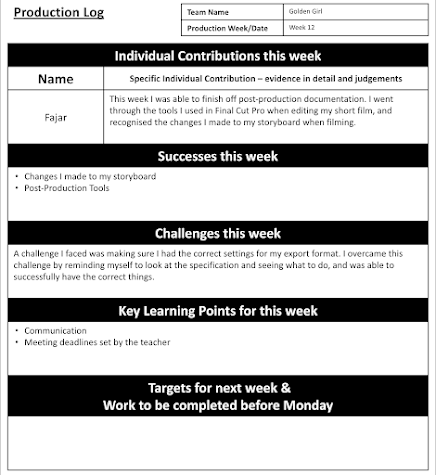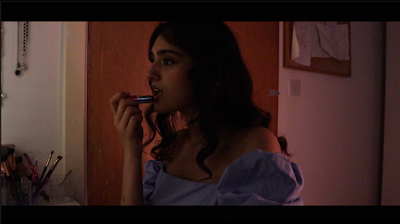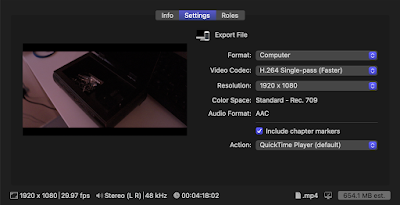Fajar Unit 5
Thursday, 20 June 2024
Timecodes to be marked as conventions in my Final Edit
CREDITS:
At 3:43 to 4:18, there are credits shown at the end of the short film
SOUND:
-0:00 to 0:45
-1:11 to 1:14
-1:46 to 3:00
-3:01 to 3:17
-3:13 to 3:43
COSTUMES & PROPS:
-1:18, 1:20
-1:30
-1:55
-2:01
-2:31
-2:55
-3:05, 3:07, 3:13
LOCATION:
-0:20
-0:50
-1:01
-1:09
Tuesday, 18 June 2024
Post-Production Tools
When editing my first and final edit, a tool I mainly used was the blade tool. I used the shortcut key (command + B) to make my editing more quick and efficient. I used this tool for cutting up videos to shorten them so I can have flawless transitions, while also using the tool for audio files to help cut up any unwanted noise that creeped into the recordings.
Here is an example:
Another technique I used were the effects presets. I used the "gaussian blur", "letterbox", "Prism" effects and more, to make the film more cinematic, and emphasise certain scenes like the hallucinating scene. I dragged the effects to the desired clip and adjusted the settings to make it effective and fit my short film.
On the top right corner, you can see an example:
A technique I carried out when editing the sound in my short film was cutting the original version of the non-diegetic soundtrack and fading it into the instrumental, to smooth over into the cinematic aspect of the film. By doing this I also lowered the volume of the instrumental so it doesn't overpower the dialogue.
Here is an example:
An editing tool I used when editing my short film was that I did colour correction on every clip used. This was so I can fix any underexposed clips, and adjust the look to keep the audience engaged and satisfied with the look of the shots. I did this by enabling colour adjustments and changed the amount of exposure, contrast, brightness, highlights, saturation, shadows, and midtones, all so the quality is higher.
Here is the before and after colour correcting:
BEFORE:
AFTER:
Finally, a tool I used to control the sounds in different clips was the volume adjuster. I used the fade in/out slider in the audio adjuster of clips, and even muted some, so that unwanted noise wouldn't come through carelessly.
Here is an example:
Changes I had to make to my storyboard during production
When filming my short film I had to make changes to my storyboard to be able to capture the best quality shots.
In one of the shots where Belle looks at the door for a second then puts her lipstick on after, I was originally going to have the camera shot from the back and the n cuts to the side. However I quickly realised that the angle wasn't that appealing for her side and back profile, and didn't properly capture the room door, so I opted to angle the camera a bit more front-faced, but still on the side, which opened up Belle's space more and overall looked much better that the original idea. It also added more variety into the camera movement.
Here is the original plan:
Export Format
When I finally finished editing my final edit, I looked at the specification to see what format the film must be exported in (H.264 and MP4). The format I chose was computer. This is so the film can export in a .MP4 file. I chose H.264 as the video codec, as the specification recommended. The resolution I chose for the short film was 1080p, as I filmed in that resolution, so exporting in 4k wouldn't have made a difference, and would've taken unnecessary space.


















.png)